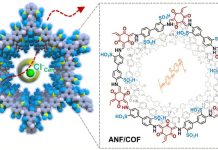
In a new study, researchers found chemicals in plastic may make the bathroom scale a less pleasant place to visit.
Every day, we come into contact with plastic products. A lot of plastic is found in food packaging.
Plastic packaging is common for practical reasons, because it is cheap and because it can increase a food’s shelf life.
But plastic contains thousands of different chemicals. Some of these can affect your metabolism, and thus perhaps also your weight.
In the study, the team found that ordinary plastic products contain a mix of substances that can be a relevant and underestimated factor behind overweight and obesity.
They looked at 34 different plastic products in the laboratory to see which chemicals they contained. These were everyday products that many people use, like yogurt containers, drink bottles and kitchen sponges.
The researchers found over 55,000 chemical components in these products and identified 629 of the substances.
Eleven of them are known to interfere with our metabolism, called metabolism-disrupting chemicals.
For a long time, experts believed that most plastic chemicals would stay in the material.
However, the team has recently shown that plastic products leach a large number of chemicals under real-world conditions, thus enabling them to enter the body.
Previous research also suggests that some plastics contain endocrine-disrupting chemicals that may affect our development and fertility. Now it appears that they may contribute to weight gain as well.
Chemicals from one-third of the plastic products investigated in the study were found to contribute to fat cell development in laboratory experiments.
The substances in these products reprogramed precursor cells to become fat cells that proliferated more and accumulated more fat.
While some plastic products contained known metabolism-disrupting substances, others did not but nevertheless induced the development of fat cells.
This means that plastics contain currently unidentified chemicals that interfere with how our body stores fat.
Overweight and obesity contribute to some of the most common causes of death in the world, such as cardiovascular disease and cancer.
They can also increase our susceptibility to various infections, such as the effects of COVID-19.
The reasons for this are of course complex, but plastic chemicals may well be a factor that we have not previously considered.
These chemicals include phthalates and bisphenols, but the new study shows that there are many more substances that trigger these problematic effects.
If you care about weight management, please read studies about diet that could boost your gut health and weight loss, and 10 small changes that could help prevent weight gain.
For more information about wellness, please see recent studies about two things that could help you maintain weight loss effectively, and results showing this diabetes drug can help people lose weight effectively.
The study is published in Environmental Science & Technology, and was conducted by Martin Wagner et al.
Copyright © 2022 Knowridge Science Report. All rights reserved.



